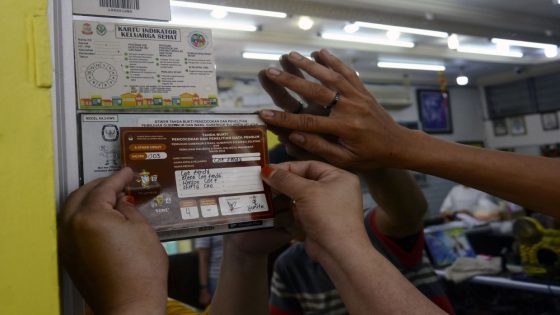THE decline in the quality of Indonesia’s democracy practically began in earnest in President Joko “Jokowi” Widodo’s second term in 2019. Recent developments, however, such as the resignation of Airlangga Hartarto from Golkar’s chairmanship, indicate an avalanche breaking down many pillars of Indonesian democracy, in this case strong and vibrant political parties.
Thus, the possibility of the party changing is worrying, because in addition to other erosions of Indonesia’s democratic institutions, it would further damage the political party’s already abysmal record. However, despite their problems, political parties are still the main vehicles for politicians to work within the system.
In the 2024 election and even back in the 2017 Jakarta gubernatorial election, the most common refrain from the business community was the wish for stability and peace. Thus, many in the business community will side with the winner. There is nothing wrong with that, business and commerce need a stable functioning government after all.
In the 2017 gubernatorial election, things got very messy. Basuki “Ahok” Tjahaja Purnama was by many measures an excellent bureaucrat. Yet, the politics surrounding his re-election campaign opened a Pandora’s box of primordial politics.
Ahok’s fiery personality and combative attitude generated fear among the minority communities and the business community for the aforementioned reasons, in addition to traumas from the 1998 racial riots. Typically, minority-minded businessman like Jaya Suprana went on raising trepidation and anxiety in various forums.
Members of the more optimistic younger generations like me did not appreciate the sentiment. In 2017, I wrote that the gubernatorial election was a litmus test of Indonesia’s pluralism and multiculturalism. Implicitly believing that Indonesia’s tolerant and multicultural society will lead to voting based on capability and performance rather than primordial and parochial interests. When Ahok lost and subsequently was imprisoned for alleged blasphemy, it did not mean that Indonesians are parochial and vote based on primordial sentiments.
The fact is, politics is complex, many issues can be manipulated and manufactured by politicians to serve their ends. Society and regular citizens are most often swayed by the whims of politicians and their games. Especially in the age of rapid social media and its machinations.
Ahok’s loss despite his 70% approval rating and imprisonment was more a testament of the ruthlessness of politics and of politicians than of the narrow-mindedness of the country’s citizens.
Indonesia remains a pluralistic society with vibrant communities interacting across religious and racial lines in their daily lives.
The point being driven here regarding Indonesia’s democratic erosion and fear among the business community, especially minorities, is that overly cautious or overly enthusiastic outlooks are unhelpful in making decisions such as who to vote for, support or fund. In general, observers will most likely agree that Indonesia is a stable society at the roots.
My research found that violent incidents had always been manufactured by rulers to prop up their weakening grip on power. Widespread resentment at the grassroots level caused by racial inequality and oppression is starkly different than in the United States, for example.
That is not to say that inequality and tensions between economic and racial groups are non-existent. They are real and problems to be addressed seriously.
In the 2024 election, we heard business, community and religious minority leaders advocating voting for Prabowo Subianto for safety. It is a wrongheaded assumption to seek protective measures at any cost.
That is not to say that it was wrong to vote for Prabowo.
If his programmes and plans are in fact in line with moving Indonesia forward in a positive way, then that vote could make sense. The main point to take is that our political and financial support should not be based on simplistic short-term views of our immediate vicinities and communities.
Returning to the current state of politics, particularly the Jakarta election, the ruling Onward Indonesia Coalition (KIM) appears to lack any significant opponent to run against their preferred candidate Ridwan Kamil.
Why does this concern the business and minority communities?
A government that has no significant opposition and can enact their will and policies unchecked and unimpeded will certainly be corrupt. As the truest political adage goes, “power tends to corrupt, and absolute power corrupts absolutely.”
A powerful government ruled by a small group of elites can undoubtedly create and get business opportunities for their closest circles. That is how humans work.
Do we think a stable, secure government under an authoritarian regime is good business?
Think again. It will be the top businesses who will reap unimpeded benefits. Lower tier businesses cannot compete based on merits.
For big businesses, is it all fine and dandy if you have connections?
The more power the ruling government gets, the more disposable people become.
Take Jack Ma of Alibaba as an example. One day you can be the whale in the country, and the next day you could be gone.
The same goes for the entertainment industry. Thus, issues of weakening democratic institutions and the rule of law being undermined are something that will eventually reach all of us at our doorsteps.
Even if you are a big whale. If we cannot lean on the proper rules of the game (the law), our lives will depend on the whims of the uncertain political world.
One simple concrete step involves the Jakarta election.
There have been rumours that although some Indonesian Democratic Party of Struggle (PDI-P) leaders were excited to have Ahok as a candidate, there was reluctance on another side because the so-called “nine dragons” (the country’s largest business groups) were unwilling to fund his candidacy.
No money, no competition.
We should not fear social tension and conflict in 2024 Indonesia. We should fear authoritarianism.
Businessmen and investors should be willing to invest in the long term of a healthy government.
A healthy government will alleviate social tension. Good and just policies will lead to a peaceful and prosperous citizenry. — The Jakarta Post/ANN
Tobias Basuki is managing director of Aristoteles Consults.
Source Agencies


